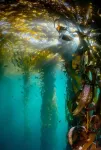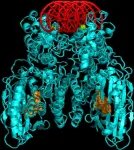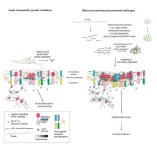Monterey Bay Aquarium study reveals how kelp forests persisted through the large 2014-2016 Pacific marine heatwave
Research also provides the first assessment of the ecosystem-wide consequences of kelp loss in Monterey Bay and offers insights for global kelp conservation
2024-02-07
(Press-News.org) New research led by Monterey Bay Aquarium and the University of California, Santa Cruz, reveals that denser, and more sheltered, kelp forests can withstand serious stressors amid warming ocean temperatures. Published in Proceedings of the Royal Society B, the study also offers the first comprehensive assessment of how declines in kelp abundance affected marine algae, invertebrates, and fishes living in Monterey Bay. The study comes after a multi-year marine heatwave – the product of a 2014 ‘blob’ of warm water prolonged by a 2015-2016 El Niño event – bathed the North American west coast with sweltering sea temperatures.
It all started a decade ago when a triple-whammy of stressors – the large marine heatwave, a sea star die-off, and a sea urchin outbreak – led to pronounced declines in kelp abundance on California’s central coast. Using a fourteen-year dataset, researchers discovered those events caused a 51% decline on average in kelp forest density in the years following the heatwave (2017-2020 vs. 2007-2013). As of 2020, the decline had increased to 72%. Some kelp forests, though, made it through these extreme events.
“We found that larger stands of giant kelp prevented shifts in sea urchin foraging behavior, and these persistent forests were better at withstanding multiple stressors,” said Dr. Joshua Smith, the study’s lead author and Ocean Conservation Research Scientist at Monterey Bay Aquarium. “Something that surprised us was that persistent kelp forests were located in areas that are typically less productive. These persistent forests had a gradual reef slope and protection from wave exposure, which enabled them to become densely packed with kelp prior to the marine heatwave.”
While this study identified the importance of habitat features in driving forest persistence, predators can also help the kelp. Another recent Monterey Bay Aquarium study reinforced the role that sea otters play in preventing kelp declines by eating up sea urchins.
Where kelp patches were more exposed and less dense, the sudden rise of sea urchins in 2014 led many kelp forests to become ‘barrens’ – areas scoured by hungry sea urchins along the rocky reef. Smith and co-authors examined changes in species composition across the mosaic of barrens and persistent forests to untangle how kelp loss impacts the broader ecosystem.
“While some kelp forests have endured, the structure of the ecological communities in the barren areas have yet to return to their pre-2013 state,” Smith added. “Across the region, the number of species did not decline, but changes in their relative abundances led to an overall decline in species diversity, most notably for marine algae and kelp-associated invertebrates.” With less kelp and other macroalgae around, the study noted a disproportionate increase in animals that eat plankton, such as barnacles, scallops, tube snails, and planktivorous fishes.
The study sought to understand the effects and resulting consequences of the marine heatwave and is part of Monterey Bay Aquarium’s larger effort to understand kelp recovery and restoration mechanisms. Globally, kelp has been declining for a half-century, and at an average rate of 1.8% a year. With over half of the ocean surface experiencing extreme marine heat every year since 2014, warming ocean temperatures present a serious threat to cold-water species like kelp. As kelp forests and other marine ecosystems around the world face increasing threats associated with climate change, conservation of ecosystems, like kelp forests, and predators, like sea otters, can mitigate the impacts of extreme events.
“This study offers important insights to help inform strategies for protecting areas where kelp can persist on its own, and siting for kelp restoration efforts, here in California and around the world,” said Dr. Pete Raimondi, a marine ecologist at UC Santa Cruz who was not a co-author on the study.
###
About Monterey Bay Aquarium
With a mission to inspire conservation of the ocean, the Monterey Bay Aquarium is the most admired aquarium in the United States, a leader in science education, and a voice for ocean conservation through comprehensive programs in marine science and public policy. Everything we do works in concert to protect the future of our blue planet. More information at MontereyBayAquarium.org.
END
[Attachments] See images for this press release:

ELSE PRESS RELEASES FROM THIS DATE:
2024-02-07
Fine motor skills in young children are linked to better GCSE scores and fewer behavioural problems in childhood and adolescence, according to a new study from the University of Surrey and Birkbeck, University of London. The authors suggest that preschool fine motor skills, including drawing, folding paper and block building, may play an important role in the pathway between infancy and later educational and behavioural outcomes in primary and secondary school.
The study showed that fine motor skills ...
2024-02-07
WASHINGTON – U.S. Naval Research Laboratory research physicist Lynda E. Busse, Ph.D., was named a Fellow of SPIE, the international society for optics and photonics, for outstanding technical contributions to the development of novel infrared (IR) optical materials and photonics devices.
Announced December 2023, the 47 new Fellows represent high-profile leaders in academia, industry, and government, and are being honored for their technical achievements as well as for their service to SPIE and the optics and photonics community. Dr. Busse was recognized along with many of the other new Fellows at the 2024 SPIE Photonics West Conference in San Francisco, California ...
2024-02-06
In May 1953, Filipino ornithologist D. S. Rabor collected a single female fruit dove on the forested slopes of an active volcano on the Philippine island of Negros. The small apple green bird, which had yellow edgings on its wings and prominent circles of bare skin around its eyes, was unlike any other known pigeon species. In 1954, Rabor and Yale professor Dillon Ripley described the unique specimen as Ptilinopus arcanus, a name inspired by the Latin word for “secret.”
The Negros Fruit Dove, as it is commonly known, has never been ...
2024-02-06
As interest in wearable technology has surged, research into creating energy-storage devices that can be woven into textiles has also increased. Researchers at North Carolina State University have now identified a “sweet spot” at which the length of a threadlike energy storage technology called a “yarn-shaped supercapacitor” (YSC) yields the highest and most efficient flow of energy per unit length.
“When it comes to the length of the YSC, it’s a tradeoff between power and energy,” said Wei ...
2024-02-06
New York, NY (February 6, 2024)—Researchers at the Icahn School of Medicine at Mount Sinai have identified a new approach to controlling bacterial infections. The findings were described in the February 6 online issue of Nature Structural & Molecular Biology [DOI # 10.1038/s41594-024-01220-x].
The team found a way to turn on a vital bacterial defense mechanism to fight and manage bacterial infections. The defense system, called cyclic oligonucleotide-based antiphage signaling system (CBASS), is a natural mechanism ...
2024-02-06
Using the Nutrition Facts labels to make food choices is significantly associated with healthy eating among eighth and 11th grade students in Texas, although the proportion of students using nutrition labels to make their food choices is low, according to research from UTHealth Houston.
A study led by first author Christopher D. Pfledderer, PhD, MPH, assistant professor in the Department of Health Promotion and Behavioral Sciences at UTHealth Houston School of Public Health, and senior author Deanna Hoelscher, PhD, RDN, the John P. McGovern Professor in Health Promotion and regional dean of the ...
2024-02-06
AMHERST, Mass. – A team of researchers from the University of Massachusetts Amherst recently published a pioneering study that answers a central question in biology: how do organisms rally a wide range of cellular processes when they encounter a change—either internally or in the external environment—to thrive in good times or survive the bad times? The research, focused on plants and published in Cell, identifies the interactions between four compounds: pectin, receptor proteins FERONIA and LLG1 and the signal RALF peptide. In particular, the team discovered that a molecular condensation process, called liquid-liquid phase separation, that ...
2024-02-06
New findings led by researchers at the American Cancer Society (ACS) and the National Cancer Institute (NCI) show more than one-third of cancer patients had a major adverse financial event – bankruptcy, lien, or eviction – before their cancer diagnosis. These patients with adverse financial events (AFEs) had a later-stage diagnosis compared with patients with no events. The findings are published today in the Journal of Clinical Oncology (JCO).
“Patients with a previous AFE not only face greater likelihood of more advanced cancer but also may encounter substantial barriers to receiving recommended care ...
2024-02-06
PHILADELPHIA (February 6, 2024) – A groundbreaking study from the University of Pennsylvania School of Nursing (Penn Nursing), recently published in Innovation in Aging, has shown promising results in improving the quality of life (QOL) and sleep quality in individuals living with memory problems. The research delves into the efficacy of a nonpharmacological approach in a trial known as the Healthy Patterns Sleep Program.
Nancy Hodgson, PhD, RN, FAAN, the Claire M. Fagin Leadership Professor in Nursing and Chair of Department of Biobehavioral Health ...
2024-02-06
The Oceanography Society (TOS) congratulates Emeritus Professor Mitsuo Uematsu on his selection as a Fellow. The citation for this honor recognizes his pioneering research on long-range atmospheric transport of Asian dust across the Pacific Ocean and its impact on marine biogeochemistry.
The nomination materials noted that Dr Uematsu’s research is of the highest quality and notable for its interdisciplinarity and international leadership, as well as its pioneering and continuing nature. These contributions are exemplified through his service on several international scientific committees such as Future Earth and the Executive ...
LAST 30 PRESS RELEASES:
[Press-News.org] Monterey Bay Aquarium study reveals how kelp forests persisted through the large 2014-2016 Pacific marine heatwave
Research also provides the first assessment of the ecosystem-wide consequences of kelp loss in Monterey Bay and offers insights for global kelp conservation






